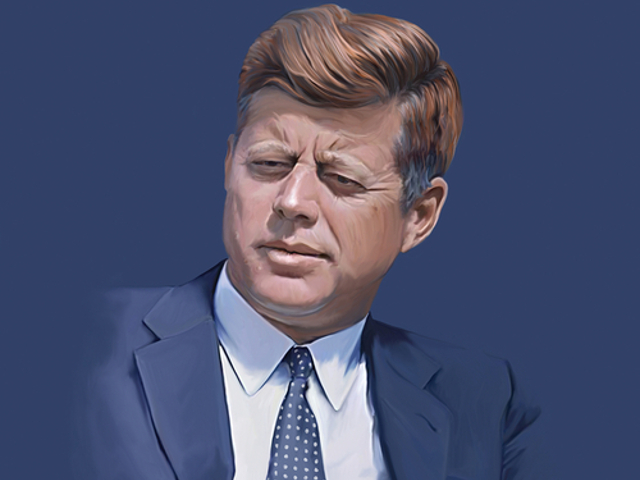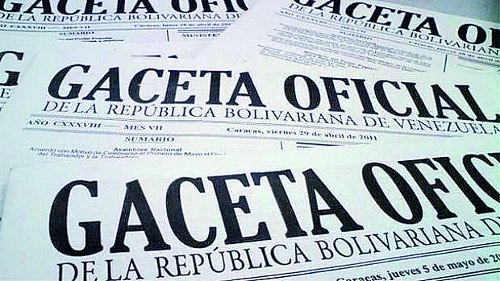. . . I am once more entrap’d in this infernal Ocean, and am totally at a loss to say when I shall be able to quit it . . .
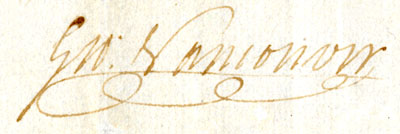
George Vancouver’s signature from the Petersham letter below. Reference code AM923
Born June 22, 1757, Captain George Vancouver was a Royal Navy officer who served on several ships during his career, including the Resolution and the Discovery with Captain James Cook. Vancouver’s most famous voyage was the 1791-1795 expedition to explore the west coast of North America and to determine if the Northwest Passage—a navigable waterway thought to connect the Atlantic and Pacific oceans—existed. This expedition was the first to produce detailed charts of the waters around the City of Vancouver. The City was named for him in honour of this voyage.
The City of Vancouver Archives has three George Vancouver documents:
- The Commission, dated July 10, 1783, appointing him fourth Lieutenant of the HMS Fame (this is the official document confirming a field commission given to him May 7, 1782)
- A letter to James Sykes (a Navy Agent in London) written from the ship Discovery (not the same Discovery used by Cook) while in Nootka Sound near the end of Vancouver’s exploration of the West Coast, October 2, 1794. Vancouver states that they have determined that the Northwest Passage does not exist, which was one of the main goals of his voyage
- A letter to James Sykes written from Vancouver’s home in Petersham, England, after his voyage, October 26, 1797
Let’s take a closer look at these documents, including transcriptions, contextual information about why they were created and the story of how each came to be at the Archives.
The Commission
. . . nor you nor any of you may fail as you will answer the Contrary at your Peril . . .
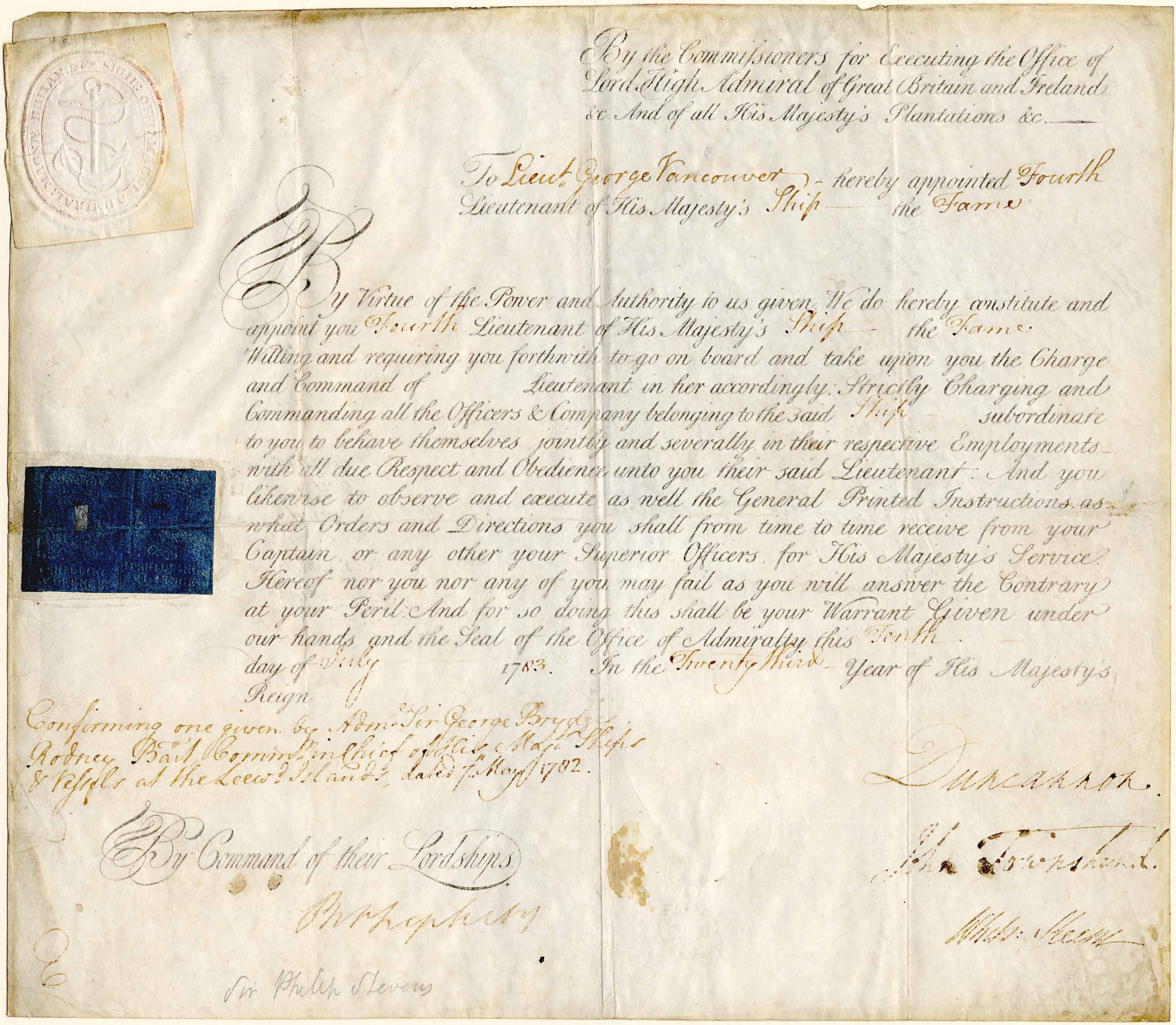
George Vancouver’s Commission to Lieutenant on the Fame, front view. Parchment. 28.7 cm H, 33 cm W. Reference code AM1062.
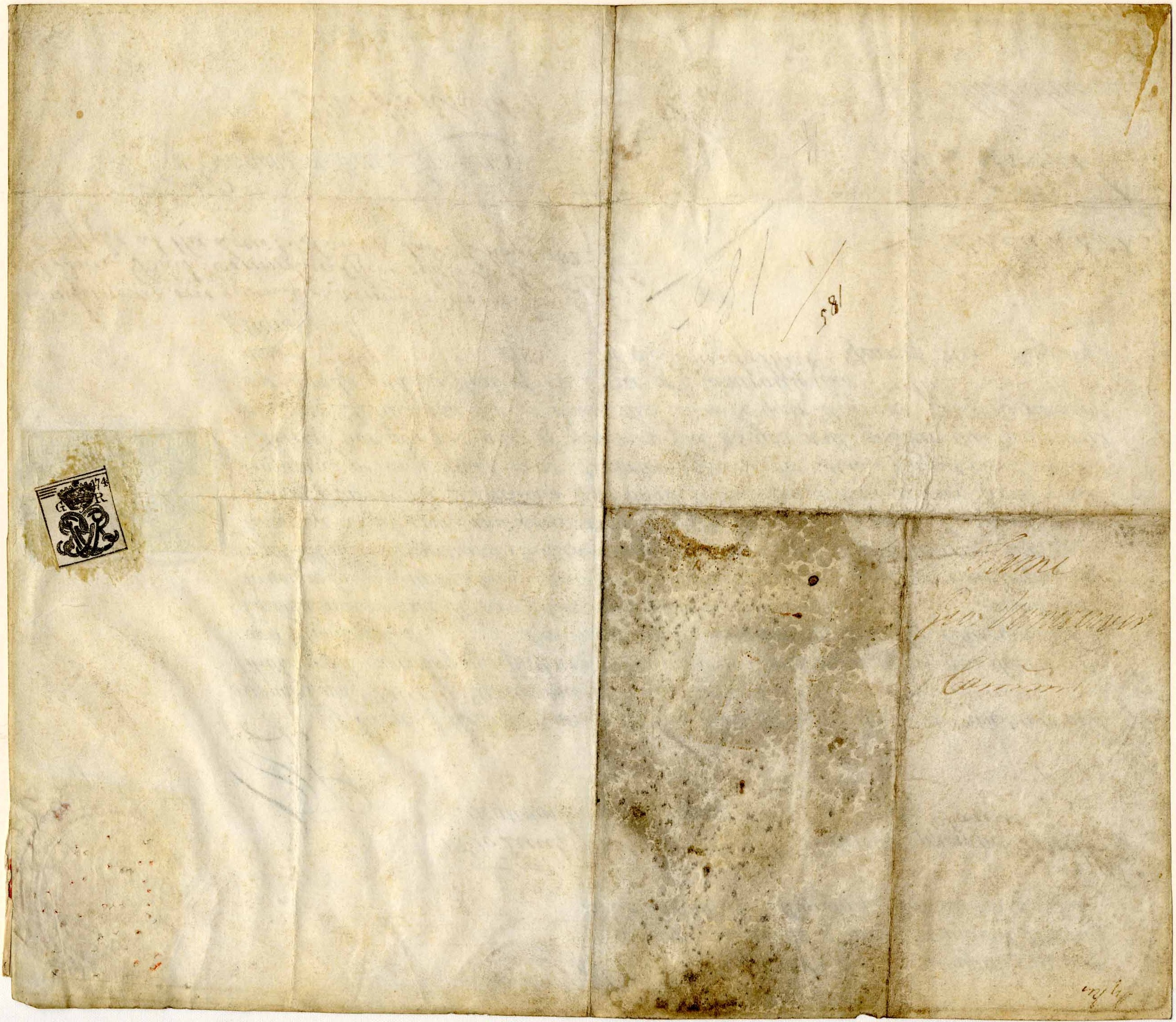
George Vancouver’s Commission to Lieutenant on the Fame, back view. Parchment. 28.7 cm H, 33 cm W. Reference code AM1062.
Transcription
Clarifications have been added between square brackets.
By the Commissioners for Executing the Office of Lord High Admiral of Great Britain and Ireland &c And of all His Majesty’s Plantations &c ___
To Lieut. George Vancouver, hereby appointed Fourth Lieutenant of His Majesty’s Ship the Fame.
By Virtue of the Power and Authority to us given, We do hereby constitute and appoint you Fourth Lieutenant of His Majesty’s Ship the Fame. Willing and requiring you forthwith to go on board and take upon you the Charge and Command of Lieutenant in her accordingly; Strictly Charging and Commanding all the Officers and Company belonging to the said Ship subordinate to you to behave themselves jointly and severally in their respective Employments, with all due Respect and Obedience unto you their said Lieutenant: And you likewise to observe and execute as well the General Printed Instructions as what Orders and Directions you shall from time to time receive from your Captain, or any other your Senior Officers, for His Majesty’s Service. Hereof nor you nor any of you may fail as you will answer the Contrary at your Peril: And for so doing this shall be your Warrant Given under our hands and the Seal of the Office of admiralty this tenth day of July 1783. In the Twenty-third Year of His Majesty’s Reign
Confirming one given by Admiral Sir George Brydges Rodney Bart [Bart is the abbreviation for Baronet], Commander in Chief of His Majesty’s Ships and Vessels at the Leeward Islands. Dated 7th May 1782.
By Command of their Lordships [three of the seven members of the Board of Admiralty]
Duncannon [Viscount Duncannon]
John Townshend [Honourable John Townshend, member of the British House of Commons]
Whitshed Keene
[and also signed by]
Sir Philip Stevens [Secretary to the Board of Admiralty. Someone has written his name in pencil below his signature]
Context
After he returned from Captain Cook’s third voyage in 1780, having spent a total of over eight years at sea, Vancouver passed the formal requirements for promotion to lieutenant: an examination and at least six years of sea time. He next served on the Martin, a sloop which patrolled the English Channel and the North Sea before being assigned to the West Indies. From that location in May 1782, he joined the Fame as fourth lieutenant with the British West Indies Fleet in the Caribbean, briefly under Admiral Rodney, then under Admiral Pigot. The Fame, a warship, took part in the Battle of the Saintes [referring to the nearby islands named for saints], a four-day battle in April 1782 in which the British were victorious against the French, but Vancouver joined the ship several weeks after this battle. Vancouver spent his time on the Fame either in New York (during hurricane season, to escape the storms) or patrolling the Leeward Islands in the Caribbean, which were held by the French, with whom the British were at war. When peace was achieved, the Fame returned home, arriving in June of 1783. The parchment commission was signed July 10, 1783.
Acquisition
It must be the key piece of this city’s historical record as the document that carried the young seaman to his destiny . . .
The commission was acquired in London, England at a Christie’s auction by George Pritchard of Bournemouth, who presented it to his nephew, Captain T.S. Annandale of New Westminster, in October, 1907 (as reported in the Vancouver Province newspaper October 14, 1907). Captain Annandale put the commission up for sale in 1936, hoping that a wealthy Vancouver citizen would purchase it and donate it to the Archives1. Instead, he had an offer from an American. The possibility of the commission leaving Canada prompted outrage in many citizens.
Excerpted from the News-Herald editorial of September 17, 1936:
“It must be kept in Vancouver. It must be the key piece of this city’s historical record as the document that carried the young seaman to his destiny. . . . It is up to the Mayor and Council to buy it, and at once, so it may be put in the place of honor in the collection of historical data, or a commanding position in the council chamber, in the new city hall.”
Excerpted from the News-Herald editorial of September 19, 1936:
“That a trifle of $1500, a clerk’s salary for a year, should stand between the city of Vancouver and possession of the commission which made Captain George Vancouver an officer in the British Navy is preposterous. . . . Mayor McGeer was reported yesterday as having said that ‘at present $1000 or $1500 is an amount that I do not think it (the city) would be justified in paying for the relic however much we might think it valuable to use for historic purposes’. ”
Although he could have used the money, as his fortunes were not good during the Depression, Annandale did not sell the commission to anyone. He did loan it to Major J.S. Matthews, the first City Archivist, for a time and had great difficulty getting it back2. According to Major Matthews, Captain Annandale wished to give the commission to the City of Vancouver, but died before he could. Annandale’s son, K. F. Annandale, presented it to the City of Vancouver May 7, 1956 (exactly one hundred and seventy-four years after George Vancouver received it) at the Vancouver Pioneers’ annual banquet.
Major Matthews wrote a memo on George Vancouver’s receipt of the commission3:
“Memo on Capt George Vancouver’s commission, prepared for F.C. Aubrey Esq., Secretary, Native Sons of B.C. Post No. 2, Vancouver, B.C. 8th Nov 1936
“Midshipman George Vancouver’s behaviour whilst at sea with the British fleet on war duty in the Leeward Islands, 1782, so excited the admiration of the famous Admiral Rodney that he appointed the young man to be a lieutenant on H.M.S. Fame, and, on the return of the fleet to port, the Lords of the Admiralty concurred, and granted the parchment commission now in British Columbia.
“The document is the charter of our names “VANCOUVER”, the city, and “VANCOUVER ISLAND”, the island. Had Vancouver’s worth not merited Rodney’s reward, both city and island would now have borne other names.
“Intrinsically, the Magna Charta of King John, and Vancouver’s commission are almost worthless; both are discolored old parchments of similiar [sic] size; their value lies in sentiment alone. Destroy sentiment, and all that the human race holds dear vanishes; one might as well be a cow. An officer’s commission is a noble document; a treasure to be cherished until death; even as a lady treasures her wedding ring.
“This cherished keepsake set in motion the career of a great British navigator whose name is uttered a million times each day, and will be, for countless generations; to permit alien hands to fondle it, to display it as a curiosity in some foreign museum, would be a blow to our national prestege [sic]. To all Canadians belongs all Canada; no public loss would follow the transfer of the few dollars requisite to purchase it from one pocket to another.
“J.S. Matthews,
CITY ARCHIVIST
“City Archives
City Hall
Vancouver
8th Nov 1936″
The Letter from the Discovery at Nootka Sound
. . . We arrived here this day month all in high health and spirits having finally determined the nonexistence of any water communication between this & the opposite side of America . . .
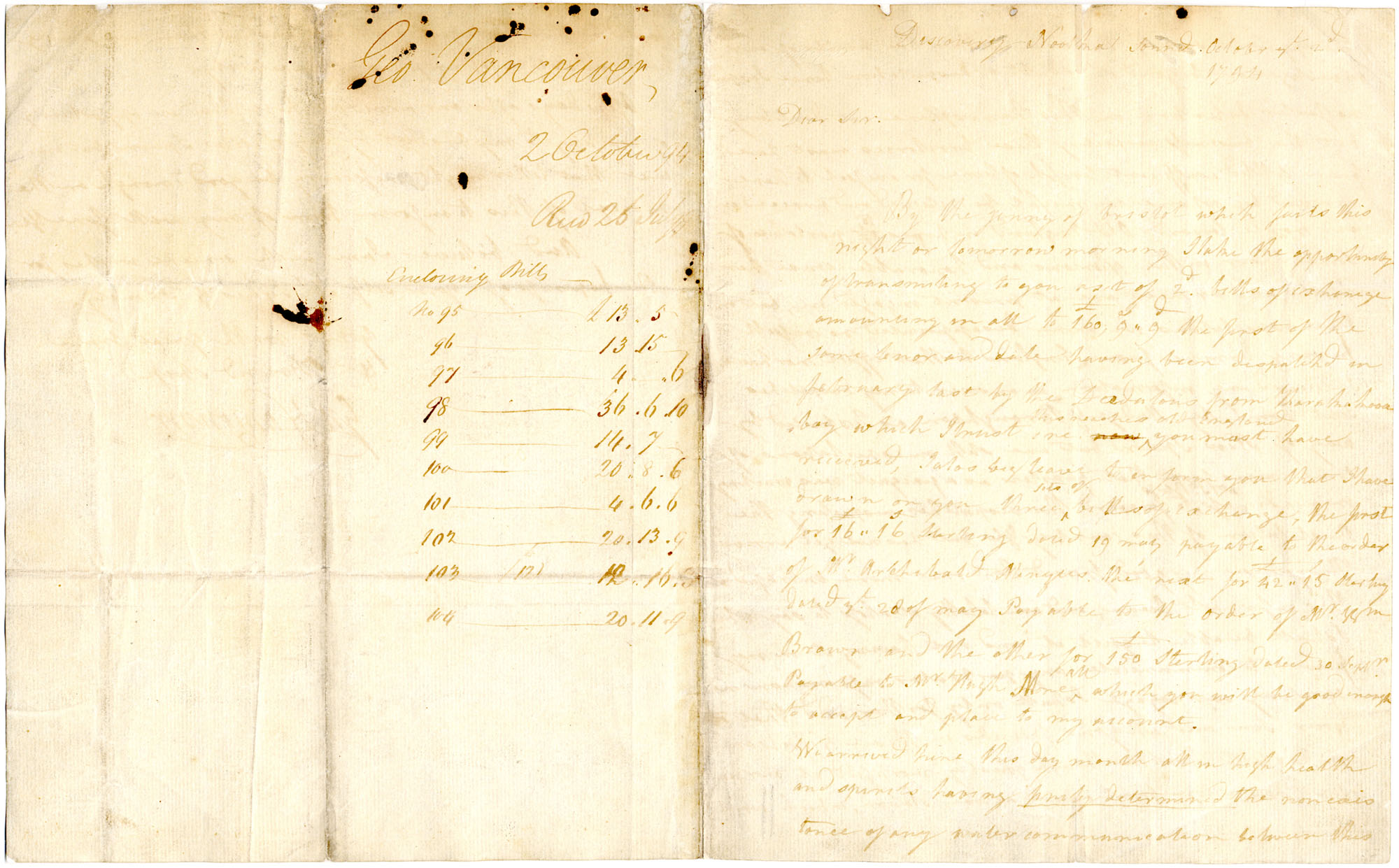
Outer pages, letter from George Vancouver to James Sykes, October 2, 1794. Unbleached handmade laid paper. 22.5 cm H, 36.3 cm W unfolded. Reference code AM649
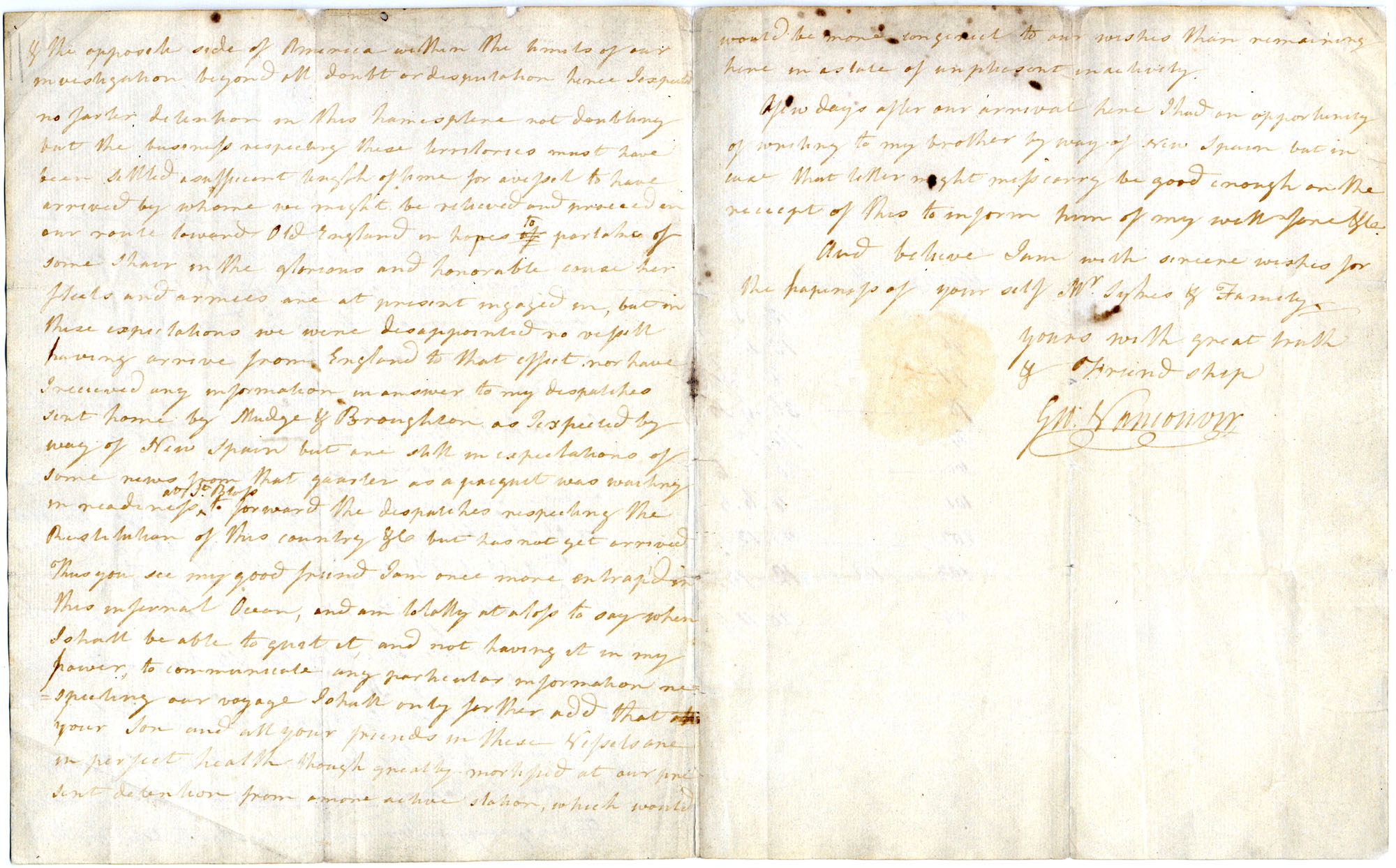
Inner pages, letter from George Vancouver to James Sykes, October 2, 1794. Unbleached handmade laid paper. 22.5 cm H, 36.3 cm W unfolded. Reference code AM649

The paper used for the Discovery letter has a watermark in the centre of the sheet, over the fold.
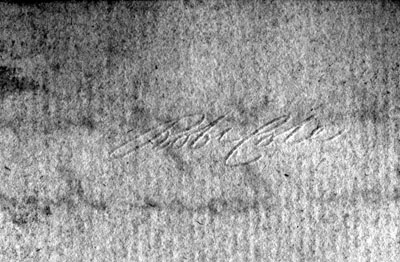
On the first page of the letter, in the top left corner, is the embossed name “Robt Cole. It appears to be an identification mark made by a collector.
Transcription
Clarifications have been added between square brackets.
Discovery Nootka Sound. October 2nd
1794
Dear Sir,
By the jenny of bristol [a merchant ship commanded at that time by Mr. John Adamson, and heading to China with sea otter skins] which sails this night or tomorrow morning I take the opportunity of transmitting to you a set of 2d bills of exchange amounting in all to £160. 9s 9d the first of the same tenor and date having been dispatched on february last by the Daedalus [a 32-gun Royal Navy frigate] from Karakakooa bay which I trust ere this reaches old England you must have received, I also beg leave to inform you that I have drawn on you three sets of bills of exchange, the first for £16. 16s Sterling dated 19 may payable to the order of Mr. Archibald Menzies. the next for £42. 15s. Sterling dated ye [“ye” used as ‘the”] 28 of may Payable to the order of Mr. Wm Brown [captain of the merchant schooner Jackal] and the other for £150 Sterling dated 30 Septr. Payable to Mr. Hugh Moore [captain of the British East India Company ship Phoenix] all which you will be good enough to accept and place to my account.
We arrived here this day month all in high health and spirits having finally determined the nonexistence of any water communication between this & the opposite side of America within the bounds of our investigations beyond all doubt or disputation hence I expect no farther detention in this hemisphere not doubting but the business respecting these territories must have been settled a sufficient length of time for a vessel to have arrived by whome we might be relieved and proceed on our route towards Old England in hopes to partake of some shair in the glorious and honorable cause her fleets and armies are at present engaged in, [Revolutionary France had declared war against Britain in February of 1783] but in these expectations we were disappointed no vessel having arrived from England to that effect nor have I received any information in answer to my despatches sent home by Mudge & Broughton [Zachariah Mudge, after whom Cape Mudge on Quadra Island was named, was sent in 1792; William Broughton, after whom Broughton Street was named, was sent in January 1793] as I expected by way of New Spain but are still in expectations of some news from that quarter as a pacquet was waiting in readiness at St Blas [now in Nayarit, Mexico. At the time the centre of supply for the Spanish fleet on the west coast] to forward the despatches respecting the Restitution of this country &c but has not yet arrived. Thus you see my good friend I am once more entrap’d in this infernal Ocean, and am totally at a loss to say when I shall be able to quit it, and not having it in my power to communicate any particular information respecting our voyage I shall only farther add that your Son [John Sykes, serving on the Discovery] and all your friends in these Vessels are in perfect health though greatly mortified at our present detention from a more active station, which would be more congenial to our wishes than remaining here in a state of unpleasant inactivity.
A few days after our arrival here I had an opportunity of writing to my brother [John, letter of September 84] by way of New Spain but in case that letter might misscarry be good enough on the receipt of this to inform him of my well fare etc.
And I believe I am with sincere wishes for the happiness of your self Mr. Sykes and Family.
Yours with great truth
& Friendship
Geo. Vancouver
Geo. Vancouver,
2 October 94
Recd 26 July 95
Enclosing Bills
|
No 95
|
___________ |
£13
|
5
|
|
|
96
|
___________ |
13.
|
15
|
|
|
97
|
___________ |
4.
|
.
|
6
|
|
98
|
___________ |
36.
|
6.
|
10
|
|
99
|
___________ |
14.
|
7
|
|
|
100
|
___________ |
20.
|
8.
|
6
|
|
101
|
___________ |
4.
|
6.
|
6
|
|
102
|
___________ |
20.
|
13.
|
9
|
|
103
|
___(£12)___ |
12.
|
16.
|
3
|
|
104
|
___________ |
20.
|
11.
|
9
|
Context
Captain Vancouver had been on his voyage on the Discovery since April of 1791, or three years and seven months when he wrote this letter. The ship was only 29 metres long and held over 100 men. Britain was again at war with France, but Vancouver was unable to participate. It is not surprising that he would express frustration at being “once more entrap’d in this infernal Ocean”. He had, only two months before, completed his survey and determined that there was no Northwest Passage. He had been instructed to survey and explore the coast between 30 and 60 degrees latitude, so Vancouver could only state that there was no Northwest Passage to be found within these limits, “the bounds of our investigations”.
In 1792, he had begun negotiations with the Spanish, as both Spain and Britain claimed ownership of the Pacific Coast. Several agreements, called the Nootka Conventions, had been signed but this had not settled the matter, only averted war. Vancouver and the Spanish officers (Ramón Saavedra and Salvador Fidalgo) waited for direction from their respective countries. Vancouver waited until October 15, and when no communication had arrived, he left Nootka for Monterey, where the winter weather was more pleasant. In Monterey, he heard that the Nootka negotiations were to be assigned to someone else, so, after allowing his crew some time to rest, he departed for England December 2, 1794.
Nootka was an important port on the west coast at the time.
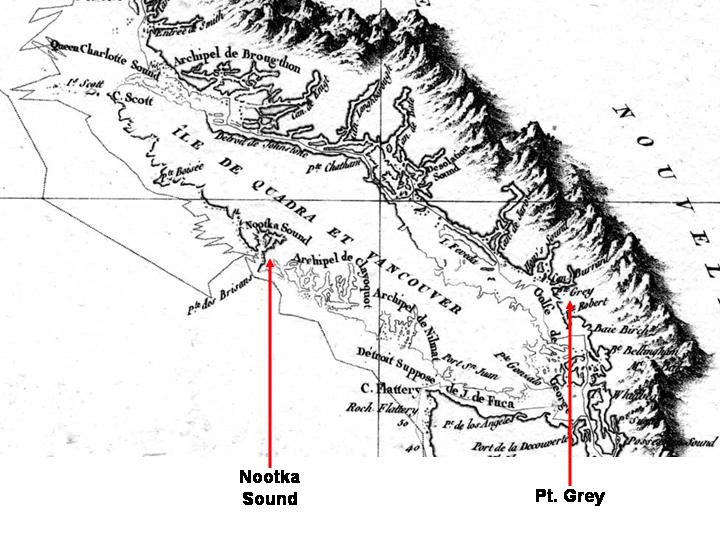
Nootka Sound was the location of the Discovery at the time of writing. Vancouver Island was then known as the Island of Quadra and Vancouver. Point Grey, now part of the City of Vancouver, is also indicated. Annotated detail from “Carte de la parte de la cote nord-ouest de l’Amerique: recconnue pendant les etes de 1792, 1793 and 1794, depuis 29D 54′ de Latitude Nord et 244D 33′ de Longitude Orientale, jusqu’au Cap Douglas par 58D 52′ de Latitude et 207D 20′ de Longitude, par le Capitaine George Vancouver, commandant la Decouverte et le Chatham avec les routes de ces deux Batimens : redigree par le Lieutenant Edward Roberts, d’apres les reconnaissances et les observations”, 1799. Reference code for base map is AM1594-: MAP 1151
Acquisition
In 1931, the letter was in the possession of the antiquarian Francis Edwards Ltd. of London, England. That firm offered the letter for sale to the Provincial Librarian and Archivist in Victoria. The price was £170, discounted from the original price of £200. At about the same time, Mrs. Margery Wade of Vancouver discovered that the letter was for sale, and in a 1933 letter, urged the Provincial Librarian to purchase it. She wrote to the seller to inquire after a lower price. In May 1937, she wrote to Francis Edwards again. Later in 1937, Mr. McAdam of B.C. House, London, called at Francis Edwards Ltd., saw the letter, and explained that Mrs. Wade did not want to re-sell the letter at a higher price, but only wanted it for historical interest. The price was reduced for Mrs. Wade. After it was authenticated in England, the letter was transported to the Bank of Montreal in Vancouver so that she could inspect it and decide if she wished to make the purchase5 . She did purchase the letter, but the final price was never revealed.
The letter was presented to the City of Vancouver Archives by Mrs. Jonathan Rogers to commemorate the City’s 1946 Diamond Jubilee. The presentation was made in Council chambers July 9 to Mayor J. W. Cornett. Mayor Cornett then gave the letter to Mrs. Eric Hamber, who presented it to Major Matthews for the City Archives.
The Letter from Petersham
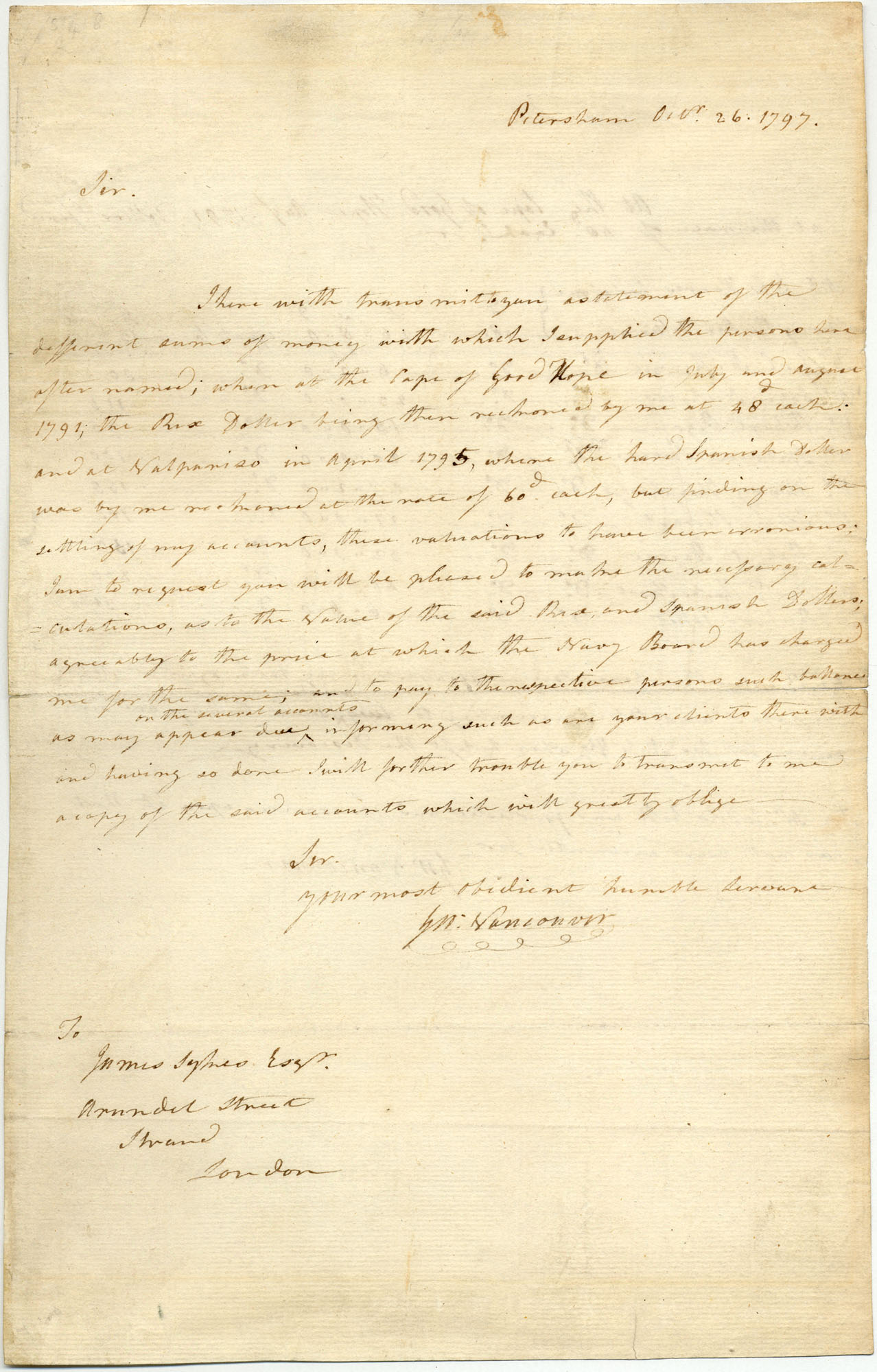
Recto (first page), letter from George Vancouver to James Sykes, October 26, 1797. Unbleached handmade laid paper. 31.2 cm H, 20 cm W. Reference code AM923
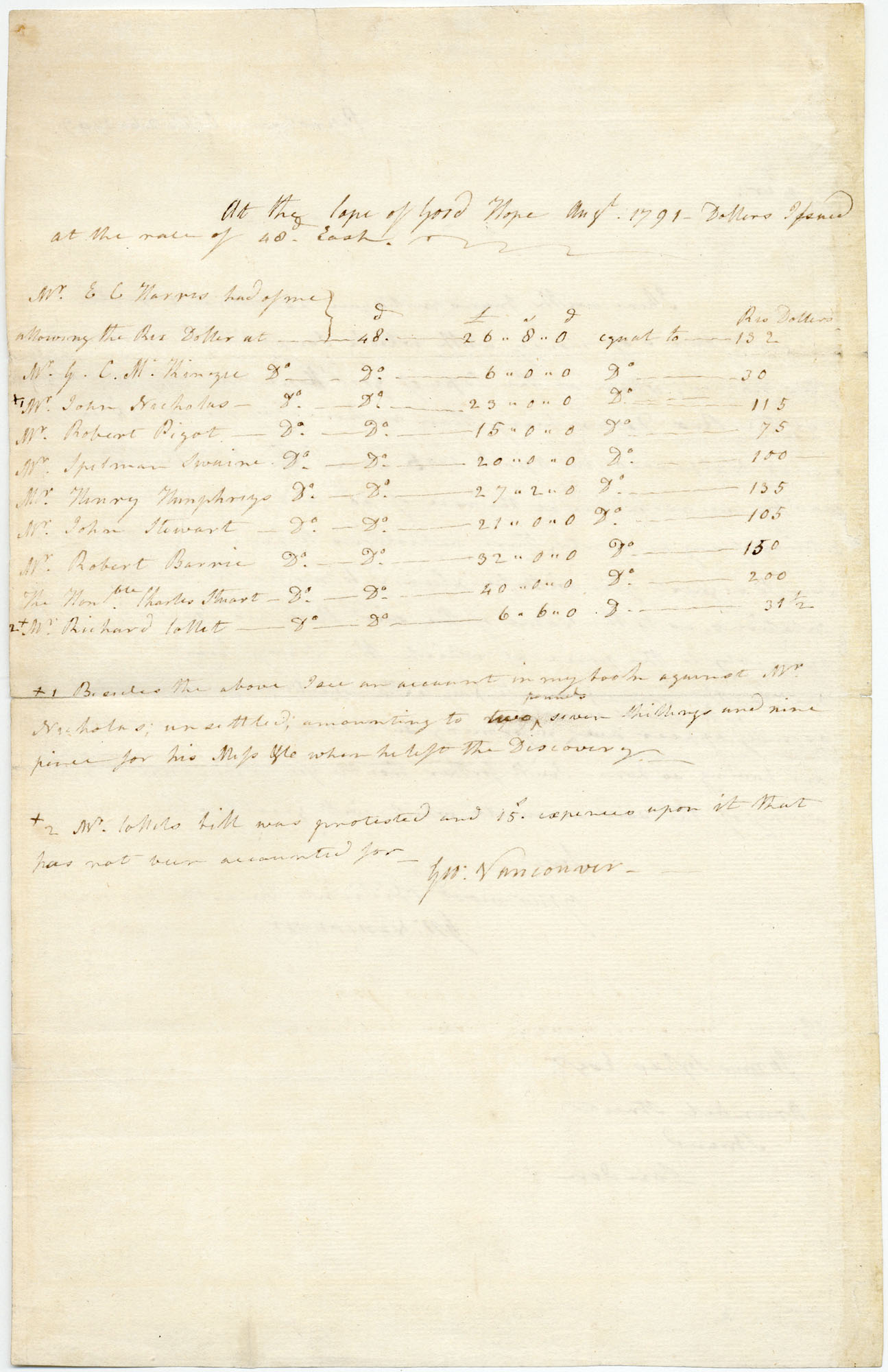
Verso (second page), letter from George Vancouver to James Sykes, October 26, 1797. Unbleached handmade laid paper. 31.2 cm H, 20 cm W. Reference code AM923
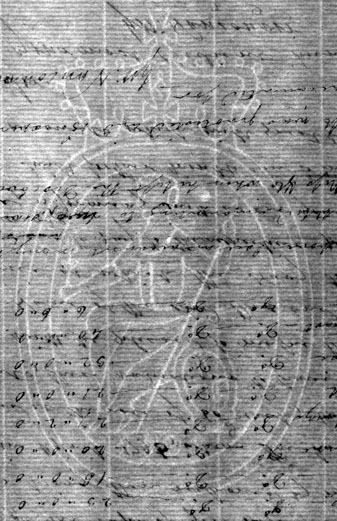
Petersham letter showing the watermark of Britannia, with no motto
Transcription
Clarifications have been added between square brackets.
Petersham Oct. 26. 1797.
Sir,
I here with transmit to you a statement of the different sums of money with which I supplied the persons here after named; when at the Cape of Good Hope in July and August 1791; the Rix Dollar [a currency used by traders in colonial America] being then reckoned by me at 48d [48 pence] each and at Valpariso in April, 1795, where the hard Spanish Dollar by me reckoned at the rate of 60d each, but finding on the settling of my accounts, these valuations to have been erroneous; I am to request you will be pleased to make the necessary calculations, as to the nature of the said Rix and Spanish Dollars; agreeably to the price at which the Navy Board has charged me for the same; and to pay the respective persons such balance as may appear due on the several accounts informing such as are your clients therewith and having so done I will further trouble you to transmit to me a copy of the said accounts which will greatly oblige
Sir.
your most obedient humble servant
[George Vancouver’s signature]
To
James Sykes Esquire
Arundel Street
Strand
London
[and on page 2 the amounts that Vancouver paid to various people are listed]
At the Cape of Good Hope August, 1791 Dollars & Pence
at the rate of 48d each.
| Mr. E.C. Narves had of me |
d |
£ |
s |
d |
Rix Dollar
|
| allowing the Rix Dollar at |
48 |
26 |
8 |
0 |
equal to _______132
|
| Mr. G.C. McKinzie |
|
6 |
0 |
0 |
30
|
| x1 Mr. John Nicholas |
|
23 |
0 |
0 |
115
|
| Mr. Robert Pigot |
|
15 |
0 |
0 |
75
|
| Mr. Spelman Swaine |
|
20 |
0 |
0 |
100
|
| Mr. Henry Humphreys |
|
27 |
2 |
0 |
135
|
| Mr. John Stewart |
|
21 |
0 |
0 |
105
|
| Mr. Robert Barrie |
|
32 |
0 |
0 |
150
|
| The Honble Charles Stuart |
|
40 |
0 |
0 |
200
|
| x2 Mr. Richard Collet |
|
6 |
6 |
0 |
31 ½
|
x1 Besides the above I see an account in my book against Mr. Nicholas; unsettled; amounting to two pounds seven shillings and nine pence for his Mess &c 6 when he left the Discovery. [Nicholas served first on the Discovery and then transferred to the Chatham, the other ship on this voyage, September 7, 1793, at Nootka Sound7. It appears he left his Discovery accounts unpaid.]
x2 Mr Collets bill was protested and 15s. expenses upon it that has not been accounted for.
Context
The sums mentioned in this letter were calculated with an incorrect currency exchange, and the men listed are owed more money. The men mentioned in the two footnotes owe money. As the Navy Agent, Mr. Sykes would be responsible for these payments.
Vancouver had returned home in September 1795. In February 1796 he moved to Glen Cottage, River Lane, in Petersham, southwest of London. He spent this time in poor health, documenting his voyage for publication. In March 1776, his brother John moved to Petersham in order to assist him. George Vancouver died on May 12, 1798.
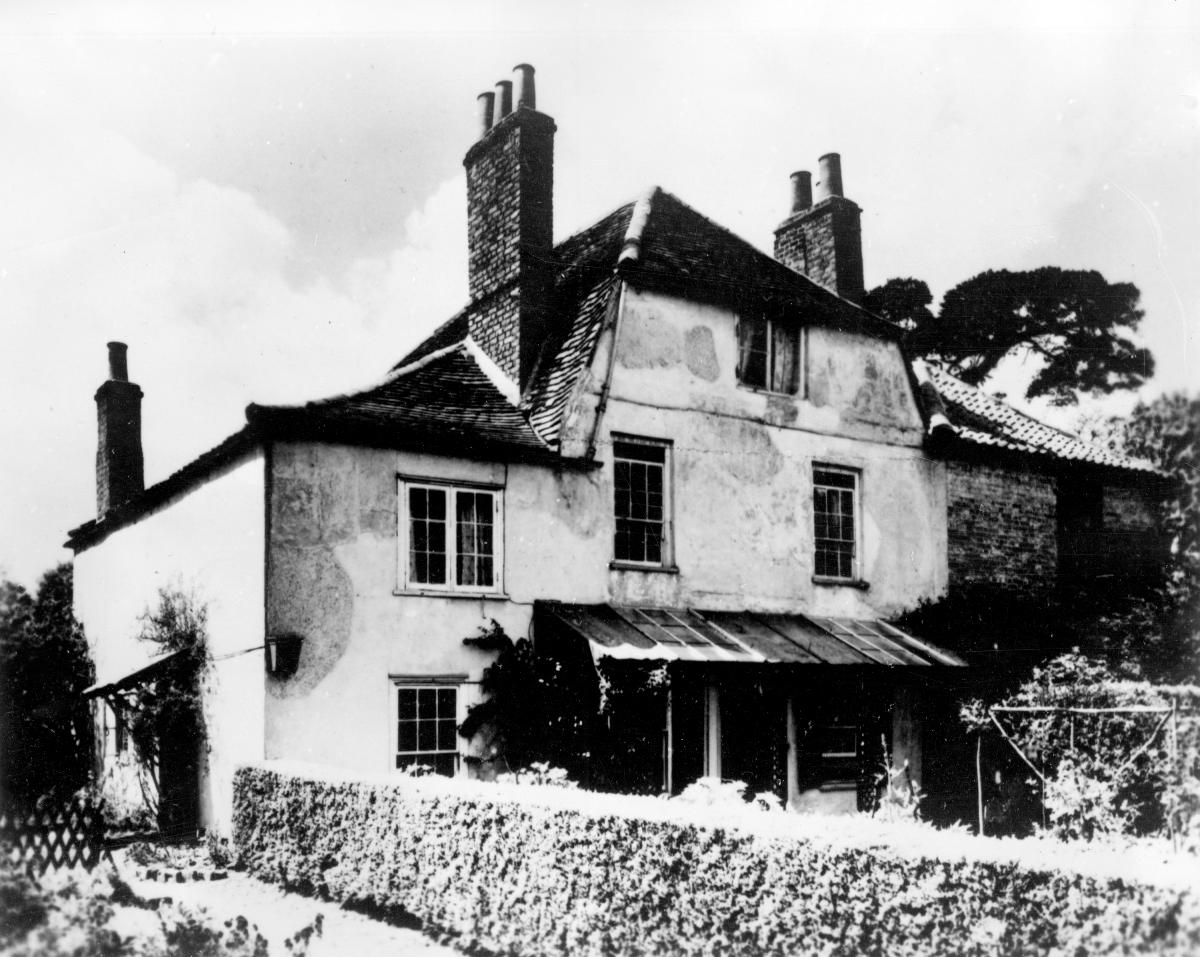
The cottage in Petersham Where Captain George Vancouver lived, 1948. Photographer unknown. Reference code AM54-S4-: Bu P359
Acquisition
This letter was purchased from Maggs Brothers, London, 1938 with funds raised by public subscription and donated to the City of Vancouver Archives. The list of contributors to the purchase fund are as follows:
Mr. G.P. Bainbridge
Alderman J. Bennet
Henry Birks & Sons Ltd.
B.C. Electric Railway Company Ltd
Mr. Charles Brakenridge, M.E.I.C.
Alderman Fred Crone, M.L.A.
Alderman H.L. Corey
Alderman J.W. Cornett
Mr. Lionel E. Curran
Alderman H.J. DeGraves
Mr. Gordon Farrell
Mr. J.H. Forester, M.L.A.
Alderwoman Helena R. Gutteridge [Vancouver’s first female member of City Council]
Mr. Howard C. Green, M.P.
Honourable E.W. Hamber [then Lieutenant-Governor of British Columbia]
Mr. Frank Jones
Mr. A.E. Jukes
Alderman T.H. Kirk
Honourable W.A. Macdonald
Honourable Ian A. Mackenzie, M.P.
Mr. D.E. McTaggart
Mr. Charles Marega
Mayor George C. Miller
Native Sons of B.C., Post No. 2
Brigadier General Victor W. Odlum
The Vancouver Daily Province
Mrs. Mary T. Rogers
Mr. Jonathan Rogers
Mr. R.L. reid, K.C
Mr. J. Fyfe-Smith
Sun Publishing Company Ltd.
Union Steamship Company of B.C., Ltd.
Vancouver Pioneers’ Association
Alderman H.D. Wilson
Maggs Brothers Ltd. of London, England
The price listed in Maggs Brothers 1938 catalogue was £638.
1Notes for the speech of K.S. Annandale, May 7, 1956. City of Vancouver Archives file “Annandale, T.S. Mayor of New Westminster”, Add. MSS 54, vol. 13, file 00071. Back to Note 1
2Ibid. Back to Note 2
3November 8, 1936. City of Vancouver Archives file “Vancouver, Captain George Letters Journals Paintings”, Add. MSS 54, vol. 13, file 04690. Back to Note 3
4Letter owned by Yale University Library. Transcribed in Lamb, W. Kaye, ed., The Voyage of George Vancouver 1791-1795, London: The Hakluyt Society, 1984, 1600. Back to Note 4
5Notes for the presentation speech, Mrs. Rogers. City of Vancouver Archives Add. MSS 649. Back to Note 5
6Thanks to Andrew S. Cook, The British Library; Stephen C. Lunsford, Stephen C. Lunsford Books, Vancouver; and Scott Redgrove, Records & Information Management, City of Vancouver, for the transcription of the words “Mess &c “. &c is an archaic abbreviation of et cetera. Back to Note 6
7Lamb, Voyage of George Vancouver, 1645. Back to Note 7
8Maggs Brothers Spring 1938 catalogue, p. 101. City of Vancouver Archives file “Vancouver, Captain George Letters Journals Paintings”, Add. MSS 54, vol. 13, file 04690. Back to Note 8











